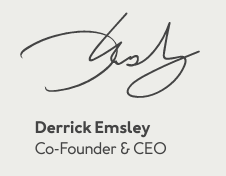We've been busy working on something new here at tentree: our Restorative Agenda.
We created this blueprint initially for ourselves, to lay out our plans to regenerate and restore natural resources and improve human well-being. In doing this, we quickly realized that to create real change it can’t stop with us. We believe all businesses can and should be restorative
.
The agenda[lLINK] outlines 5 areas where we have both an impact and an opportunity to drive positive change; Transparency, Climate, Product, Nature and People. Across each of these topics, we lay out our vision, goals, and plans to become more a Sustainable and ultimately Restorative business.
Read on for what tentree co-founder and CEO, Derrick Emsley, has to say about it.
Letter from tentree co-founder and CEO
Over half of the world’s GDP,
$44 trillion
, is dependent on nature.
We rely on healthy, functioning ecosystems to provide the natural resources needed to support humanity and provide essential products and services, but nature is in crisis. The rapid loss and degradation of natural ecosystems poses a significant risk to the global population and to corporations, meanwhile, the Intergovernmental Panel on Climate Change (IPCC) warns of devastating impacts of climate change unless transformative action is taken. Systems change has never been so urgent, and momentum is growing for the Climate Positive and Nature Positive movement. People too are at the center of this - we need a just future for all.
The Kunming-Montreal Global Biodiversity Framework has ushered in a new era of action on nature, introducing 23 global targets to achieve by 2030. Integral are targets to reduce the loss of areas of high biodiversity importance and ecological integrity, conserve at least 30 percent of the world’s land, coastal areas and oceans, and restore 30 percent of terrestrial and marine ecosystems. Investment needs to scale dramatically to restore our planet’s ecosystems, protect biodiversity, mitigate and adapt to the impacts of climate change, whilst overcoming inequalities and providing intergenerational equity. A total investment in nature of ~ US$8.1 trillion by 2050 is required for the world to meet its climate change, biodiversity and land degradation targets: a fraction of the value that nature creates. Business must lead to bridge the investment gap. It is no longer enough to do less harm; businesses need to actively invest in doing more good.
It is more critical than ever for businesses to understand and act on nature related dependencies and impacts, and provide investment where it is most needed. To date corporate disclosure on nature has been lacking, but this is beginning to change. Corporate focused initiatives such as the Taskforce for Nature-related Financial Disclosures (TNFD), the Science Based Targets Network (SBTN), amongst others highlight how understanding nature related risks, dependencies and impacts are as critical and urgent as climate change.
Collectively, we need to redesign what it means to do business and co-create an inclusive, restorative economy that prioritizes conservation and does no additional harm to intact ecosystems, avoids take-make-waste models and supports Indigenous People and local communities most impacted by the climate crisis.
The path to becoming a restorative business is a journey. We don’t have all the answers. We are still charting the path ourselves. We hope this Restorative Agenda [LINK TO PDF] will inspire debate and action. We take inspiration from the good work of many also charting this path.
As the saying goes, crisis brings opportunity. Let’s use this crisis as an opportunity for creating a future that is positive for Climate, Nature and People.
Photo of Derrick?


